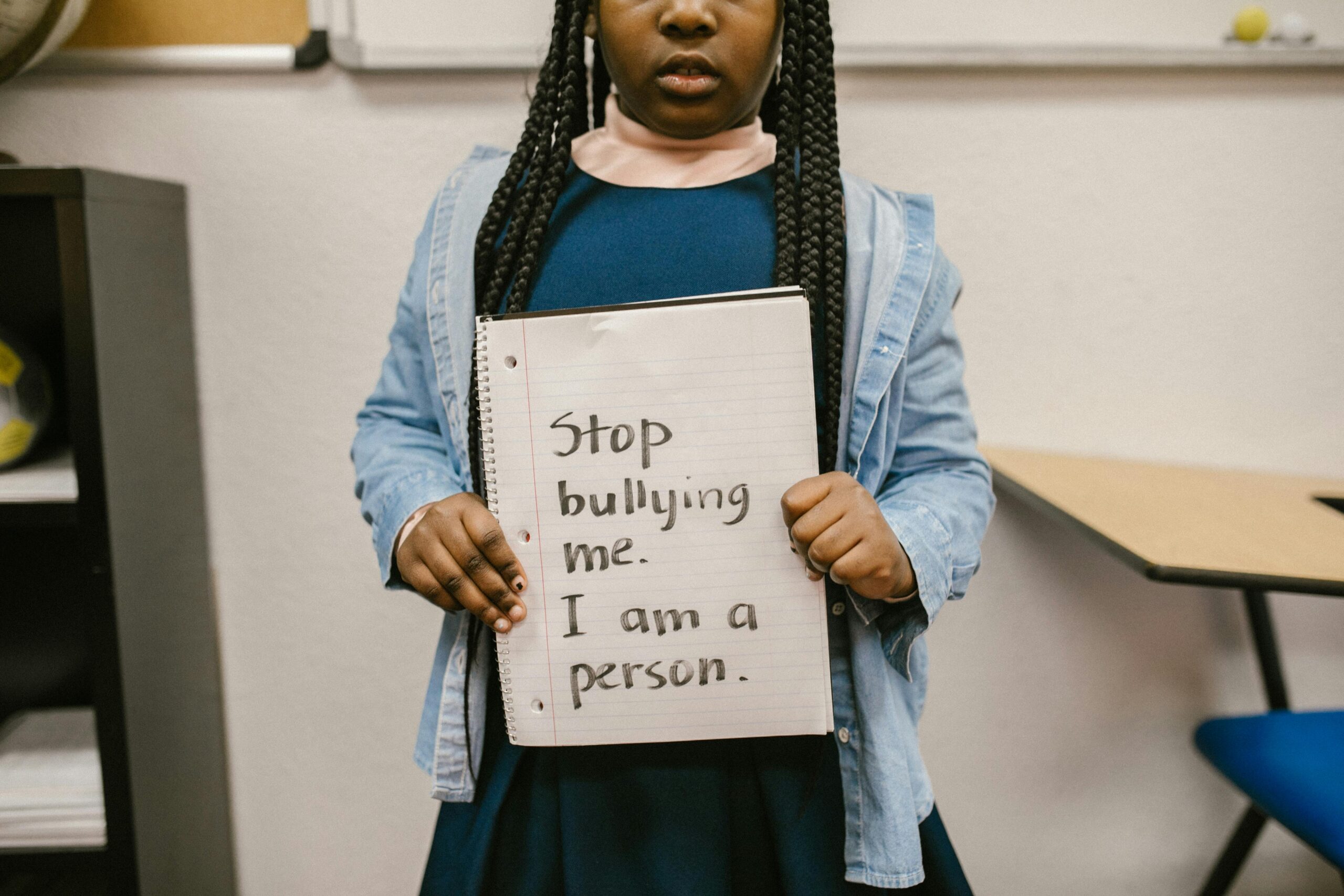Racial bullying is all too common toward mixed-race individuals and persons of color. It affects us all, especially mixed girls and women who have grown up around less-than-tolerable people.
If you face racial bullying, know that it’s a “them problem.” I know that this alone isn’t enough to help you work through mistreatment, so I’m going to walk you through what you can do if you or your child is the victim of racial bullying.
There are different levels of bullying, but every type is harmful.
Maybe you’ve been suffering from abuse (verbal and/or physical) for years. If you’re reading this, you’re probably fed up. You want to learn how to stand up for yourself and get the respect you deserve.
You might feel, or you have felt like you have to “tough it out.” You don’t and you shouldn’t.
Nobody should have to know how it feels to:
- Endure constant abuse
- Have no one stand up for you or check on you
- Have no good friends who understand (or at least try to understand) what you’re going through
Unfortunately, many of us do.
So, if you’re a victim of racial bullying, read on to learn what you can do to protect yourself and heal one day at a time.
Racial Bullying Examples
Racial bullying can take many forms. Some common experiences include:
- Physical bullying throughout adolescence
- Comments about your appearance, culture, accent, etc.
- Blatant insults based on the above or even something that has nothing to do with your race (someone might bully you because of your race but they target some other aspect of who you are)
Racial bullying can even go to extremes like sabotage, targeting in fights, and many other horrible situations.
This type of bullying doesn’t only come from other races. Mixed individuals often have a hard time fitting in with those of the same race who are monoracial. You may feel forced to “pick a side” and suppress the other side of you to fit in with one group¹. A common experience is being told that your racial experiences aren’t valid because you’re mixed.
No matter who’s doing the bullying or why, this type of treatment can affect your (or your child’s) self-esteem and identity development in devastating ways.
Racial Bullying in Childhood and the Lasting Harm It Creates
Kids can be brutal. When we’re young, we’re still learning how to process our emotions and communicate with others. However, there are plenty of children out there who’ve never been taught how to treat others.
Other times, children absorb what their parents say and do at home, either toward them or others, and hurt others outside of their home because of it.
I remember when I was younger, the teacher needed to briefly step out of the classroom. She asked me to watch the class and help support her in the moment. As I did what I was asked to do, some of my classmates started bullying me about my clothes. They said I must have thought I was better than everyone else. I remember crying in school that day. I didn’t think I was better than anyone else. I was just trying to exist as me.
Looking back, I think moments like this one were what made it difficult for me to stand out and be myself. Instead of raising my hand when I knew the answer, I started keeping my mouth shut and my head down in fear.
These moments of pain can hide in your subconscious and show up in the form of limiting beliefs and unhealthy coping mechanisms. If you’re an adult who’s experienced racial bullying, you’ve likely carried these feelings around in your subconscious. Consider how they might have shown up in your relationships (with yourself and others). Think about the times you held back from pursuing opportunity and success because you were worried about stepping into the light.
Some of the consequences of racial bullying (and bullying in general) include:
- Poor mental health
- Lower academic participation
- Unhealthy, dangerous, and devious behaviors
A review of several studies found that even teachers often²:
- Dismiss bullying concerns
- Contribute to bias and discrimination
As a parent, it’s important to know what’s going on with your child and help them address racial bullying in a healthy way. Their long-term health and well-being depend on the support they receive.
Racial Bullying in Adulthood
I have heard this twice in the last week, so it’s only right to share it here.
“Good girls don’t win, bold girls do.”
This does not mean that you should harden your heart or be rude. It means that you have to stand up, speak out, and rise above others’ malevolent words and actions. Regardless of your age, you’ll interact with hateful people. You’ll come across adults who project their thoughts, perceptions, and inner hurt onto others. After all, hurting people hurt people.
Now, what can you do about this? You have two options.
- You can allow these words and actions to chip away at your health and happiness.
- You can stand up for yourself and what you know is right (setting an example for others in the process).
One study on workplace bullying found that victims suffer from³:
- Stress
- Negative emotions
- Physical symptoms associated with the above
Of the over 200 full-time employees surveyed, 97% had experienced general bullying. Overall, African American employees were most likely to take action to respond to bullying.
Surveyed employees gave some suggestions for how their organization could respond to bullying including:
- Meetings
- Seminars
- Required training
- Better response procedures
Racial bullying in adulthood may look a bit different, but it doesn’t hurt any less. You’re allowed to be hurt, sad, or upset when you face it. However, please don’t allow it to stop you from loving yourself and living life the way you want.
What to Do if You’re Experiencing Racial Bullying
Depending on where the bullying is occurring, and how severe it is, determine which steps are necessary. However, I encourage you to respond even if you believe it’s not that severe.
- Keep a record of incidents.
Keep any messages, emails, or other evidence of racial bullying in case it escalates.
Even if you don’t have to get the law involved, it’s important to have this information on hand for your safety.
- Stand up for yourself.
If you’re being bullied at your job, talk to your boss or whoever has the ability to make decisions.
Never allow someone to get away with racial bullying unless standing up for yourself would put you in harm’s way. If that’s the case, wait until you’re in a safe place to proceed.
- Contact the police.
If you feel unsafe at any point, don’t be afraid to get law enforcement involved.
Racial bullying isn’t only emotional. It can be physical and it can escalate to unsafe levels.
All these apply if your child is being bullied, but there are some extra steps you can take in this situation.
What to Do if Your Child Is a Victim of Racial Bullying
- Listen to your child and understand where they are mentally.
If you find that your child, in this case, your mixed daughter, is facing bullying, your first step is to talk to her about her experiences and help her know you’re there for her. Help her stand up for herself.
If you’re a Mama Bear, Papa Bear, or Grandad Shark (or whatever you may be), I know your instinct is to fight the world when your little girl is hurting, but this is not the time or place.
Set a good example for her and take the necessary steps to resolve the problem.
- Talk to those who have authority.
After talking to your child, schedule a meeting with her teacher, principal, and whoever else is involved. The last thing you want to do is brew a storm of revenge or silence in your child, so be mindful of what you’re saying and doing when addressing the issue.
Use this as an opportunity to suggest ideas for creating a more inclusive environment. Studies have found that multi-ethnicity friendships and a respectful outlook on diversity are protective factors against bullying involvement⁴. So, make sure to also talk to your child about race and inclusion.
- Get your child further support.
Bullying, especially racial bullying, can greatly impact your child’s view of themselves and the world.
Your daughter (or son) will likely need additional support to mitigate the negative effects of bullying. Whatever you do, don’t ignore any sign of change in your child’s behavior. You can do a lot to address bullying and set a positive example.
Getting support also applies to you if you’re a victim of racial bullying.
I offer transformational coaching for mixed girls and women to help them cultivate healthy beliefs, habits, and behaviors that allow them to thrive personally and professionally. Please reach out if you’re struggling to become the person you know you can be.
Dr. KayLa N. Allen is an International Motivational Speaker (DEI, Identity, Leadership, and Girls and Women’s Empowerment), Thought Leader, Multicultural Women’s Transformational Coach (Diversity, Identity, and Leadership Coaching) – Certified Health and Well-Being Coach (for Women), and a Leadership Development Consultant. Learn more about her services and how you can begin your journey through professional/leadership transformation and personal evolution/personal development by clicking the button below.

